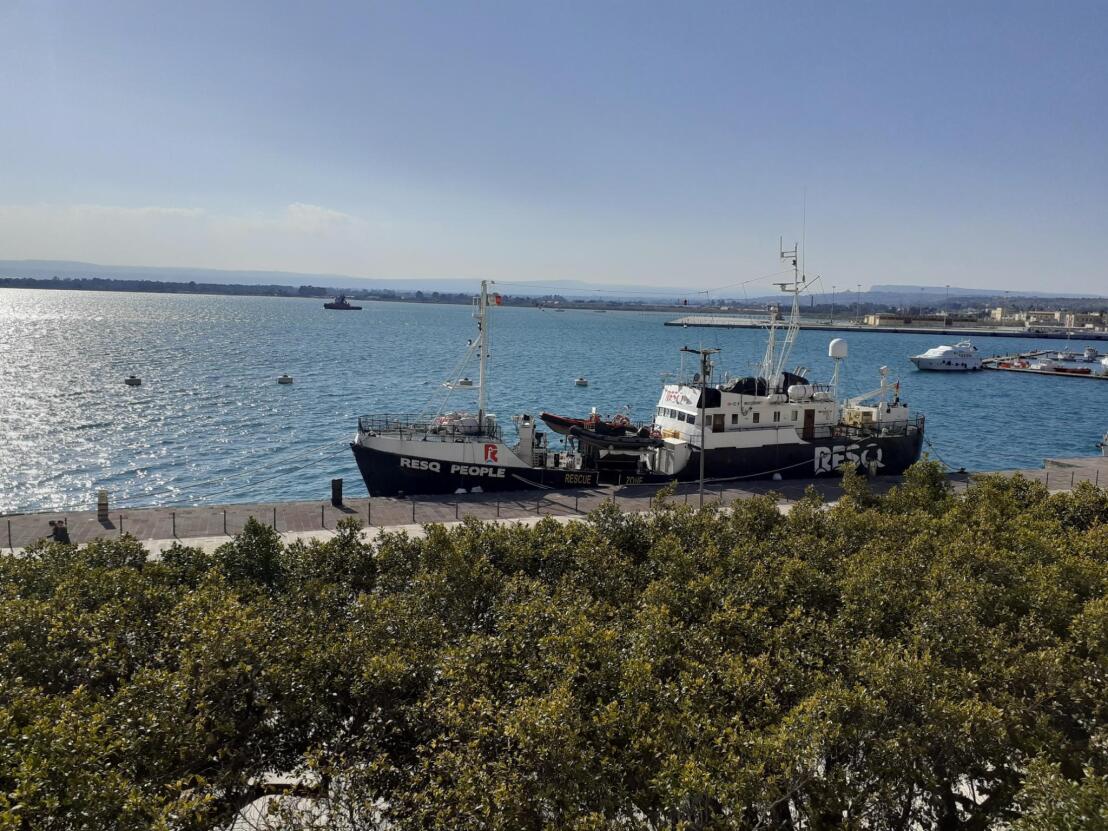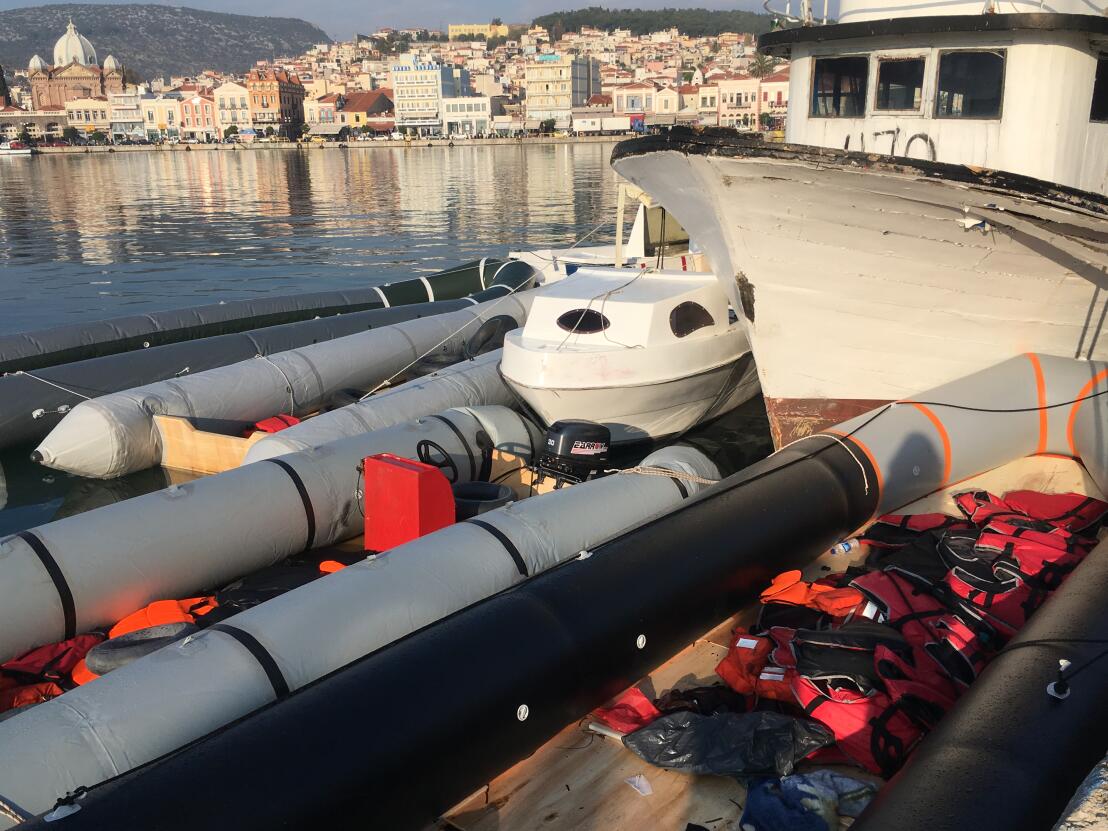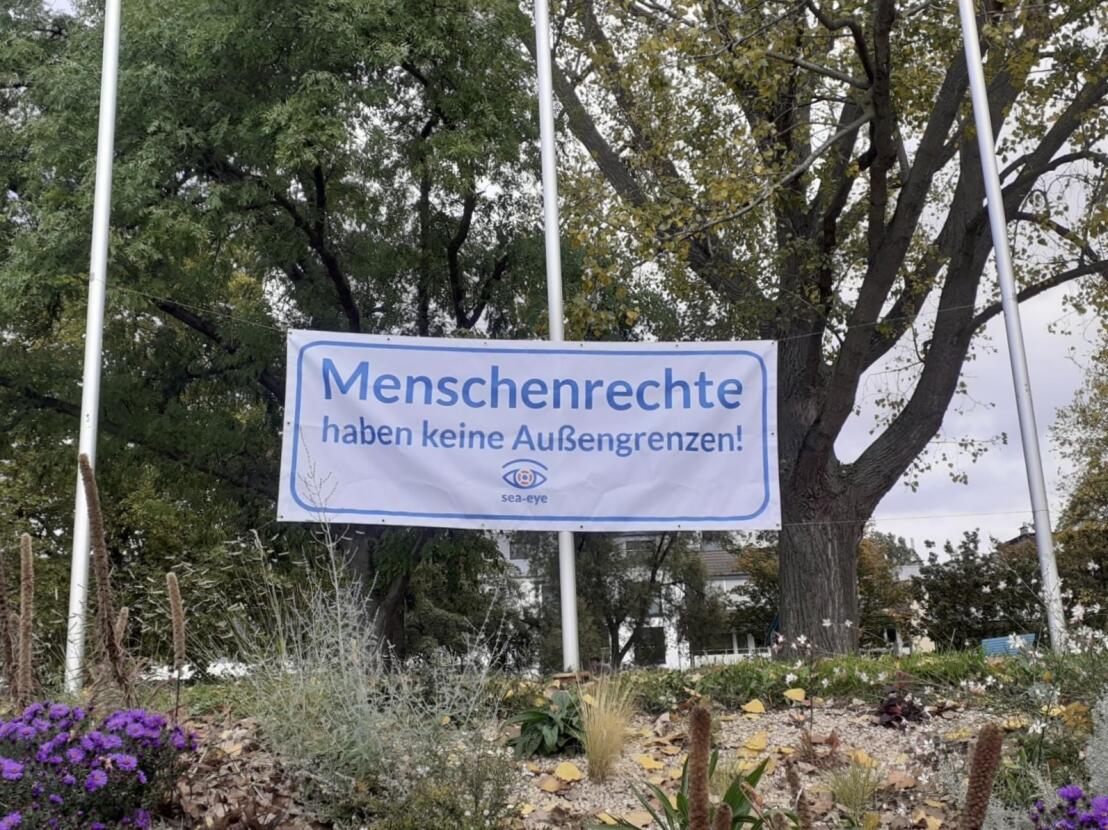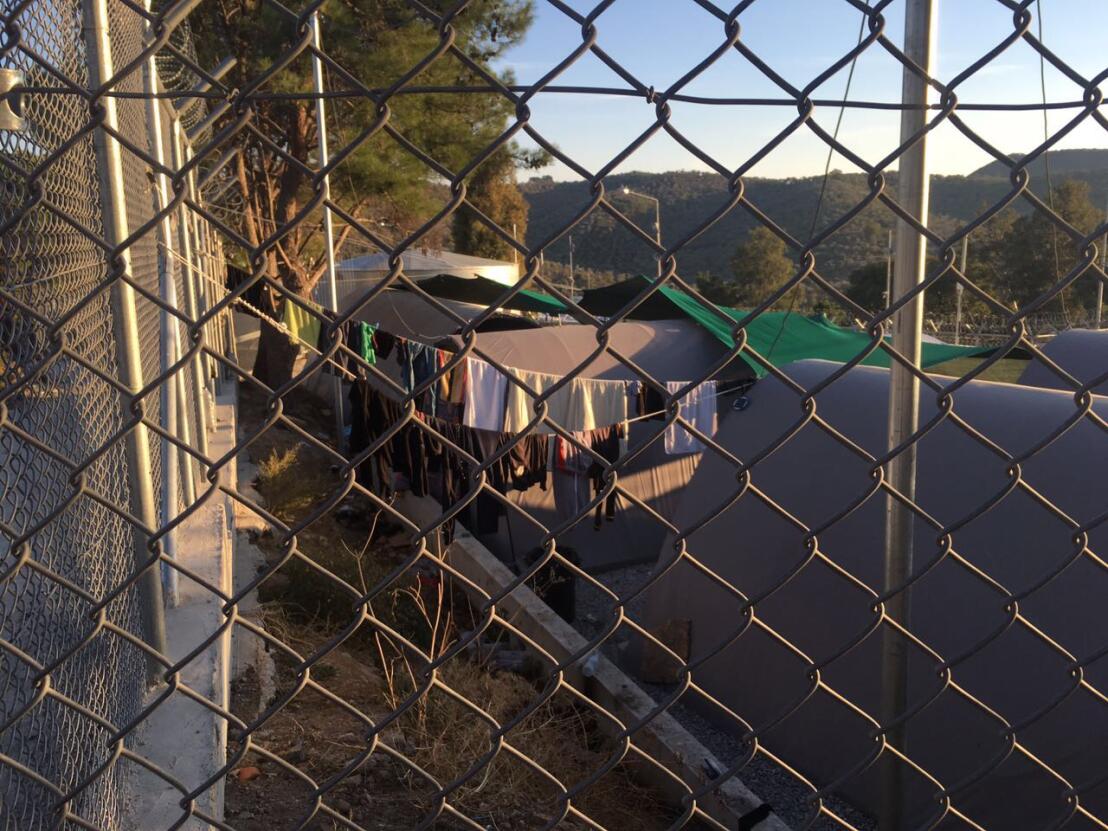About the Project
Research Group Navigating the Mediterranean: Search and Rescue Missions and the Dissensus on Democracy (ZivDem), Gerda Henkel Foundation

ZivDem research group argues that within the practice and discourse of Search and Rescue (SAR) Missions in the Mediterranean, a dissensus on what democracy is or should be crystalizes.
By interlocking perspectives from sociology, political science, anthropology, and democratic theory, the project focuses on the practice of and the European discourse on SAR missions in the Mediterranean. We assume that a social movement is emerging around the work of the sea rescuers, which, based on the claim that refugees should not be left to die in the Mediterranean, criticizes supranational and national border policies. Consequently, the SAR NGOS and their support structures become a projection space for authoritarian, racist, and anti-migrant positions in the struggle over the reception of refugees and migrants in Europe. Therefore, the dissensus evolving around SAR missions manifests as a debate about the concrete design of common EU migration and asylum policies and the future of European democracy itself.
The interdisciplinary research group is funded by the Gerda Henkel Foundation from 2022 to 2025 and by the Forum Internationale Wissenschaft of Bonn University (total volume: 270,000€). The group works at the universities of Bonn and Münster.
The research group’s structure
The research project comprises three sub-projects: Sub-project I analyses the Mediterranean border regime regarding its legal and political relations. Sub-project II examines civil society reactions to SAR NGOs in a cross-national comparison. Referring to the empirical results from sub-project I & II, the democratic-theoretical sub-project III asks to what extent SAR missions can be understood as a critical practice fighting over the (future) meaning of democracy.

Democracy is more than just a form of government. Democracy is a contestatory practice. It is characterized by challenging opinions and political struggles which fight over hegemony without branding the other’s position as inferior or eliminating oppositional beliefs. In recent years, however, this central idea of (liberal) democracy has been vigorously attacked by authoritarian movements and ethno-nationalist parties in the name of democracy itself. They use specific threat scenarios that mark clear images of the enemy: Democracy is threatened by ‘strangers’ and their defenders. For example, their defenders include people and groups involved in aiding and supporting refugees. The ‘stranger’ par excellence includes migrants, refugees, and asylum seekers. However, anti-migration resentment and racism do not signify marginal positions that a resilient democracy has to endure. Instead, both are gradually seeping into the so-called ‘center’ of society: fields of the sayable are being expanded, anti-migrant resentments are being normalized, and the privilege of whiteness is being (uncritically) reproduced. Against this backdrop, we argue that authoritarian positions claim an anti-democratic right to challenge democratic ideals of freedom and equality. They do not seek to keep the controversy over democracy going. Instead, they want to end it once and for all. As a result, they eliminate democracy as soon as their opinion prevails.
From this current diagnosis, ZivDem joins perspectives from sociology, anthropology, political science, and democratic theory. It focuses on the practice of and the European discourse on SAR missions in the Mediterranean. We assume that a social movement is forming around the work of sea rescuers and SAR NGOs. Based on the claim that refugees should not be left to die in the Mediterranean, it criticizes supranational and national border policies. In the controversy over the reception of refugees and migrants in Europe, the central actors of SAR missions and their support structures become a space of projection for authoritarian and anti-migration positions. With the controversy over sea rescue, we find ourselves amid debates about the concrete design of the common EU migration and asylum policy and, ultimately, of European democracy.
In this debate, we observe different narratives and discourse positions: First, they represent reactions towards the (policy) failure of EU institutions, EU member states, and Mediterranean states. Secondly, a moral-humanitarian motive is employed in rescuing that renders the Other’s suffering visible. Thirdly, we find discursive strategies that construct SAR missions as criminal acts. They claim that SAR missions do not have any legal-political mandate and therefore support illegalized mobility. We summarise these narrative-discursive elements with the terms (de-)politicization, moralization, and criminalization.
In the discourse on SAR, however, not only questions about Europe’s treatment of refugees manifest. Rather, as the thesis of the project suggests, the practice of and the discourse on SAR currently form a focal point of the struggle over democracy’s future. Generally speaking, we observe two opposite positions regarding the future of democracy: Activists and supporters of SAR NGOs demand an expansion of the political participation of migrants and refugees in line with the European normative orders and value systems. In contrast, regressive-authoritarian positions narrow ‘democracy’ to nationalist and essentialist motives, from which demand for exclusion derives. For them, rescuing the lives of othered populations, such as migrants, threatens democracy because it overstretches it by overburdening the capacities and resources of the so-called host societies. At the literal borders of democracy, the tension between democracy and migration society arises, whose underlying principles, unity on the one hand and openness on the other, initially seem to exclude each other. However, contemporary democratic theory offers speculative forays and conceptual experiments in sketching a democracy to come.

Sarah Spasiano (Doctoral Researcher), Mareike Gebhardt, and Lena Laube (both Principal Investigators)
Sub-project I analyzes the Mediterranean border regime during 2013-23 concerning the multidimensionality of the institutions and groups involved. Since 2013/14, SAR NGOs have been established in several European countries to address the acute lack of rescuing capacities for refugees in the Mediterranean Sea. This “humanitarian fleet” aims to save people at risk of drowning during their journey to Europe. The SAR missions of NGOs such as Sea Eye, Sea-Watch, and Proactiva Open Arms are based on the international legal obligation to rescue people in distress at sea and bring them to a port of safety. However, EU member states have repeatedly hindered their work since 2016. Nevertheless, the dissensus about the necessity and admissibility of SAR Missions did not cease. Within this dissensus, we observe different narratives and discourse positions. First, it is pointed out that SAR missions can be understood as a reaction to the (policy) failure of EU institutions, EU member states, and Mediterranean states in North Africa. Second, a moralistic-humanitarian motive is invoked related to rescuing and rendering the suffering of othered populations visible. Third, we witness the criminalization of SAR missions that state how SAR NGOs supposedly have no legal-political mandate. Instead, they are accused of supporting and fostering illegal migration to the EU or Europe.
The case of SAR missions in the Mediterranean illustrates that not only the EU, its member states, and (supra-)national border management agencies are involved in the assemblage of the Mediterranean border regime. Rather, it also includes North African partners and their coast guards, privately funded organizations dedicated to the observation and documentation of refugees and the rescue of people, as well as commercial and military vessels, and ultimately refugees and people on the move, whose mobility evokes the legal and political reactions of the EU to increased or changing migration movements in the first place.
The sub-project I formulates the thesis of the mutual interdependence of all parties involved: EU member states depend on each other, as, for instance, the debates surrounding the Dublin Regulations have shown. Due to their strategies of externalizing border controls, they are also dependent on the willingness of so-called third countries to cooperate with them, e.g., with Libya since the reassignment of the SAR zone by Italy. The increasing technological surveillance of the Mediterranean by FRONTEX additionally raises the question of which actors actually have access to the information on refugees in distress at sea in the first place and can act accordingly. Finally, the involvement of civil organizations and aerial observation of refugees on the high seas ( e.g., Alarm Phone) entailed new interdependencies.
Regarding methods, the study of SAR missions, their practices and juridico-political frameworks, is based on document analysis, field research with narrative or semi-structured interviews, and observations.

Maria Ullrich (Postdoc) and Lena Laube (Principal Investigator)
From a cross-national perspective, sub-project II analyzes the civil society discourse on SAR missions in three EU member states (Germany, Italy, and Spain). It focuses on political and civil society actors influenced by the actions of non-governmental organizations (NGOs) to position themselves in the agonistic struggle over the meaning of SAR missions in recent years. In addition to the various SAR NGOs in Europe, and especially in Italy, Spain, and Germany, an increasing number of municipalities, churches, aid organizations established in other fields, political parties, artists, and journalists are addressing the issue of SAR missions.
We argue that a social movement emerged around the SAR discourse for which rescue ships are emblematic of individual and collective moral and/or political responsibility. To examine our thesis empirically, we ask which larger political issues and conflicts civil society actors associate with the practice of SAR and where the mobilization potential of this protest movement thus lies. Moreover, a social movement only exists when a ‘network of networks’ emerges, and different groups build political alliances with common goals. The question of (non-)belonging, recognizability, and acceptability ultimately raises how the demos constitutes itself: how it must remain negotiable in a democratic society. Here, we are particularly interested in the lines of argumentation that are used to justify positions for more political inclusion.
The discursive dynamics are surveyed in Germany, Italy, and Spain for 2013-2023 using field research, participant observation, guided and problem-centered interviews, and document and media analysis.

Mareike Gebhardt (Research Fellowship and Principal Investigator)
Sub-project III foregrounds a democratic-theoretical perspective on the European discourse on SAR missions. It follows the approaches of radical democratic theory by Chantal Mouffe, Jacques Rancière, and Jacques Derrida. Taking the democratic promises of equality and freedom seriously, all authors call for a constant deepening of democracy via dissensus, i.e., politicization. The project extends these approaches by discussing postcolonial perspectives pointing to the colonial continuities of the Mediterranean border regime (cf. Achille Mbembe).
The radicalization of democracy occurs through democratic dissensus and agonistic struggles: Non-hegemonic positions and marginalized populations contest the powers of normalization. They fight for their visibility within the so-called majority society; for example, they do not have citizenship of the polity in which they live or because their position is considered less valuable through mechanisms of racialization. In contrast to the authoritarian-populist convictions that there is an end to dissensus implying an end to democracy, dissensus must be maintained: the democratization of democracy is never done but always “to come” (Derrida). Thus, a more democratic future for Europe must not be an endpoint but the beginning of reshaping Europe democratically, namely radicalizing it.
In a first approach, the sub-project thus asks whether and to what extent SAR missions can be understood as a radical democratic practice of dissensus. In this context, democratic theory not only refers to an analysis of democracy but sketches the contours of democracy regarding its future. With Derrida, sub-project III argues that democracy is characterized by radical relationality and mutual dependence instead of autonomy and sovereignty.
Second, concerning the practice and discourse of SAR, sub-project III analyzes whether and to what extent SAR missions radicalize democracy: Do they fight to realize a more democratic Europe? Thus, can they be understood as a practice of a “democracy to come”?
Using the two central concepts of “dissensus” and “democracy to come,” sub-project III builds on ZivDem’s thesis of the crystallization point and spells it out as follows: First, the practice of SAR missions can be interpreted as a political struggle over the democratic future of Europe, not just humanitarian aid. It is where a democratic practice of dissensus crystallizes. It makes marginalized positions, such as those of refugees and migrants, visible by drawing attention to the necropolitical letting die in the Mediterranean. Accordingly, SAR missions can be understood as agonistic democratization in the mode of dissensus (thesis 1).
However, SAR missions face the danger of de-politicization by limiting themselves to humanitarian aid. Countering its massive discursive criminalization with moralization thus de-politicizes SAR. The regressive political order the European border regime belongs to is not democratically challenged but instead stabilized.
With a democratic-theoretical view on (forced) migration that takes postcolonial perspectives into account, sub-project III asks whether and to what extent SAR missions reproduce a Eurocentric (white) paternalism to save othered populations and therefore maintain existing racist and racialized relations of domination and power: In this case, SAR neither practices political dissensus nor democracy to come (thesis 2).
Members of the research group


Links
- https://www.fiw.uni-bonn.de/de/forschung/demokratieforschung/team/dr-mareike-gebhardt
- https://www.fiw.uni-bonn.de/en/departments/research-on-democracies/team/dr-lena-laube/dr-lena-laube?set_language=en
- https://www.fiw.uni-bonn.de/en/departments/research-on-democracies/team/maria-ullrich/maria-ullrich?set_language=en
- https://www.fiw.uni-bonn.de/en/departments/research-on-democracies/team/sarah-spasiano?set_language=en